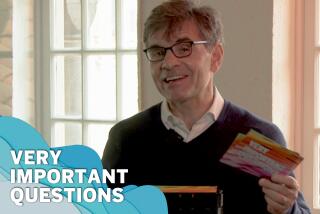We’ve heard this story before
What with mortgages exploding and recession in the air, there isn’t much to laugh about in the American economy this holiday season. So we should be grateful to the high-tech industrial complex for once again staging the hilarious comedy that’s become an annual holiday tradition, right up there with “A Christmas Carol.”
Yes, the farce known as the e-book is back this year, thanks to Amazon.com and its new device, the Kindle -- which, like innumerable electronic books before it, promises to kill off books printed on paper. The high-tech industrial complex has been trying to get that antique medium, with its hopelessly unwired pages, out of our lives for years. This is a bit strange because nobody, except a few self-styled digital revolutionaries, views the old-fashioned book as an obstacle to human happiness. In fact, to most readers the book is still exactly what’s it always been -- pleasure incarnate.
This is what makes the perennial e-book ritual so delightfully absurd. It’s a revolution with no popular support, a technological turning point that never turns, despite the best efforts of its credulous promoters.
By now, you’ve almost certainly heard about the Kindle. One essential element of the e-book script is that the media go into full hype mode, declaring that the most important invention since Gutenberg’s press is about to hit the market. Newsweek led the chorus this time with a breathless cover story that dubbed the Kindle “the future of reading.”
Every new e-book has some killer feature that supposedly makes it a giant leap forward from all previous e-books. The Kindle’s is wireless connectivity. It’s “a perpetually connected Internet device,” Newsweek says, “the first ‘always-on’ book.” This means that in addition to buying books (at Amazon’s Kindle store) and reading them, you can use the device to download newspapers, magazines and blogs. The Kindle can surf the Web as well as send and receive e-mail via “your private Kindle e-mail address.”
Imagine: another e-mail address and in-box where people can reach you, even when you’re curled up in bed with your favorite novel. Won’t that be fun? There’s also the distinct possibility of digital ads, beamed down to you as you read. The Kindle won’t be doing that -- not yet -- but you know somebody eventually will, and LowerMyBills.com ads will be leaping out from the pages of “Slaughterhouse Five.” What joy.
I haven’t tried the Kindle yet, but I have test-driven some of its predecessors, including last year’s ballyhooed e-book, the Sony Reader. The Reader uses the same display technology as the Kindle -- a screen that attempts to mimic ink on paper and is actually quite pleasant to use. It’s fun to play with these things. If you fire one up in public, there’s the inevitable “wow” reaction, which will be enough to persuade some people to fork over $399 for a Kindle this Christmas.
You’ll get buzz, but you won’t get a real book. E-books are pitched as an improvement over the older medium, but in many ways they’re a step backward. The traditional book isn’t just a container for content. It’s a brilliant machine that interacts in very particular ways with the body and the mind.
For instance, cognitive researchers Abigail J. Sellen and Richard H.R. Harper, authors of the 2002 book, “The Myth of the Paperless Office,” have found in studies of office workers that when it comes to reading, the tangibility of paper gives it distinct advantages over electronic screens. When you’re reading on a screen, the eyes and the brain are constantly at work figuring out where you are on the page, how many pages from the end of the text, etc. With paper-based media, the fingers and hands take over much of the navigational work: Because you can feel where you are, the brain is freed up to concentrate on the words themselves. This is one reason why it’s easier to immerse oneself in a hard-copy book than in a long-form text on a screen. The book itself -- its physical presence and format -- has a dramatic effect on how we experience the content.
And who needs connectivity in a book? At its best, reading is about intimacy and isolation -- unplugging from the world, the exact opposite of the CrackBerry lifestyle. You don’t have to be a Luddite to recognize this, or over 30. The school-age kids I know love their books as much as their video games, and don’t want to see either disappear. The “Harry Potter” books have sold 400 million copies, and not a single one could send e-mail.
The market will keep real books alive unless and until an e-book comes along that does the job just as well, and I don’t think we’re anywhere near that with current e-book technology. The Kindle may turn out to be a nice convenience for travelers who don’t want to lug multiple books around with them. But for everyday pleasure reading, the book still has it all over any screen. And you never have to recharge the battery.
Way back in 2000, a Time Inc. magazine called Time Digital (now defunct) ran a panting cover story about the “e-book revolution” that was going to start at any moment. The cover image showed Shakespeare holding an old-fashioned book while peering anxiously at an e-book. “There is reason to believe the American consumer will want e-books,” the story said, “although he isn’t yet aware of this desire.” Funny, I’m still not feeling it.
More to Read
Sign up for our Book Club newsletter
Get the latest news, events and more from the Los Angeles Times Book Club, and help us get L.A. reading and talking.
You may occasionally receive promotional content from the Los Angeles Times.






